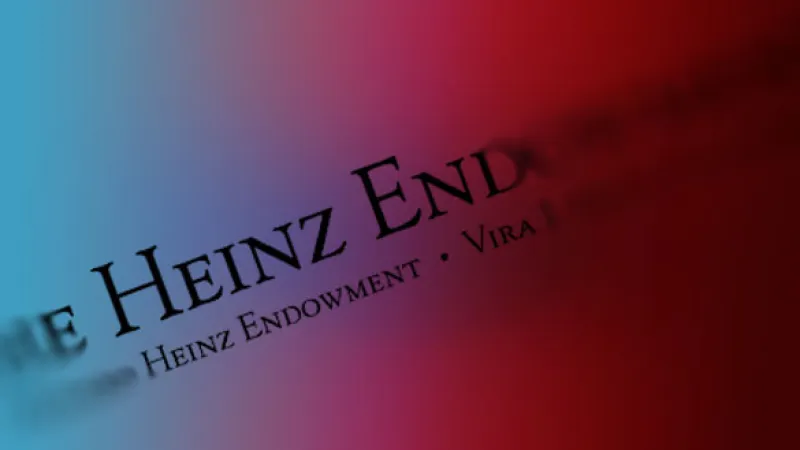The Heinz Endowments, a decades-old foundation created by the family that started the H. J. Heinz Company, best known for its ketchup, is suing a former employee for embezzling almost $1 million of its funds.
The Pittsburgh-based foundation that last reported having more than $2 billion in assets, filed a complaint against Charles Richardson on June 10 in the U.S. District Court for the Western District of Pennsylvania, claiming he defrauded the organization by invoicing it for software and services that were never provided by a company he owned. He is also accused of selling some of the foundation’s computer servers to a third party and directing the cash from the sale to his company. Additionally, the lawsuit claims that Richardson attempted to cover up his thefts by deleting, or attempting to delete, thousands of emails and documents and damaging equipment.
Richardson was hired by The Heinz Endowments in 2014 as a senior technology advisor and was responsible for developing, implementing, and managing all aspects of its technology operations. During his employment, Richardson also served as a consultant to the Heinz Family Office and the Heinz Family Foundation, which both shared computer servers and tech systems with his employer. According to his LinkedIn, Richardson was the chief technology officer at the Heinz Family Office for more than 17 years.
Richardson began a paid leave of absence in October 2023 and, after an internal investigation began in December, he was fired by The Heinz Endowments in January. "The Heinz Endowments is committed to a vibrant southwestern Pennsylvania where everyone is treated with fairness and respect and has the opportunity to reach their fullest potential. We are deeply saddened that the actions of a former employee have caused us to file a federal lawsuit and to engage law enforcement,” The Heinz Endowments said in a statement.
The organization added: “The allegations centering on fraud in the legal complaint reflect conduct that is unimaginable for someone who had been a trusted colleague for many years. We are heartbroken and will now allow the legal process to run its course. No core financial, HR, or grantee record systems have been impacted. We remain steadfast in our focus on our mission.”
Richardson could not be reached to comment on the case. No attorney was listed as representing him in the court docket.
TribLive was first to report about the complaint filed by The Heinz Endowment. It also reported that Richardson was arrested after a domestic dispute on April 30, 2023 and is facing assault and other charges.
Certain purchases made by Richardson prompted the investigation by The Heinz Endowments last year and then he attempted to meddle with the probe, according to the foundation’s lawsuit. Late in the morning on December 19, The Heinz Endowments, with help from a third party unnamed in the complaint, made digital copies of Richardson’s email inbox and system activities, then disabled his access to his email and administrative control over its systems — or so they thought.
An hour after restricting Richardson’s access, Chris DeCardy, president of The Heinz Endowments, told him the foundation was performing an audit of his expenses and that his remote access would be suspended while it was ongoing (Richardson was still on a paid leave of absence at the time). But by the end of the afternoon, Richardson “improperly, surreptitiously and without authorization accessed The Heinz Endowments’ servers and IT systems” remotely using a foundation-provided computer, or one purchased using its funds, the complaint says.
After he regained access, Richardson gave himself administrative control of the system again and began deleting, or attempting to delete, thousands of emails and documents over the course of 12 hours. Among the things he was trying to make disappear were messages directly related to his activities at the foundation, which the complaint argues was a clear attempt to impede the investigation.
For three days, according to the lawsuit, Richardson continued to access, or attempt to access, The Heinz Endowments servers. On December 21, he allegedly admitted in a text message to a Heinz Family Office employee that he had accessed the servers and claimed his purpose was innocent, despite DeCardy telling him he was no longer authorized to do so. After the repeated invasions, Richardson was fired.
When the investigation concluded, the foundation claims it discovered that Richardson defrauded the organization for seven years by invoicing it for software and services that were never provided by a company he didn’t disclose that he owned, Ops Unlimited. The foundation has accused him of using that scheme and others to embezzle $960,000. The Heinz Endowments is seeking damages that will be determined during a trial.
In a May report, the law firm Dentons warned that family offices needed to more seriously consider both external and internal threats that could upend their operations, including fraud.
Want to read more stories like this? Subscribe to Officium, a biweekly newsletter for family-office employees by Michael Thrasher, a senior reporter at Institutional Investor based in New York.







